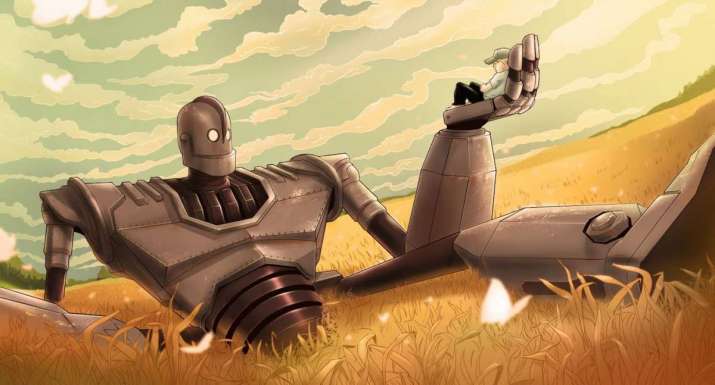FEATURES|COLUMNS|Silk Alchemy
Seizing the Now with Wisdom, Compassion, and Foresight
 “You are who you choose to be,” The Iron Giant (1999). From blogspot.com
“You are who you choose to be,” The Iron Giant (1999). From blogspot.com“Growing old is a privilege denied to many,” the poignant aphorism reminds us.
Yet for those of us privileged enough to see old age, challenges await. Not least as modern societies have sadly evolved curious and even demeaning attitudes toward aging. Fortunately this seems to be changing, especially as the current reality is that there are more people on this planet thriving well into their golden years than in recorded history. There was a time when we held an unquestioned respect for our elders. They were the wise ones from whom we sought hard-won wisdom as we, the young ones, were still figuring out the ways of life. There are many areas in which sagacity can be gleaned only from experience. They may not have all been shamans, but regardless our elders may have reminded us of a few choice insights: life goes fast; don’t sweat the small stuff; it’s all in the details; appreciate the simple things; relish the complexities; be brave; love without fear; we’re all in this together, so be kind . . .
As Buddhists we may call it all Samsara, but even within the span of a single lifetime we can experience the cycles of death and rebirth. Cycles of change. Within the rhythm of life, we are all spinning that hamster wheel. Our elders were in our place not that long ago, looking after their own elders. They were seeking the same earthly fundamentals as you. As me. As every generation. Security, love, autonomy, and a life that felt like it held value. And while each turning of time brings with it circumstantial differences and challenges, some far more remarkable or terrible than others, we were all young once. We all had childhood dreams about our ensuing lives. We were all hit by the realities of adulthood. We all wanted to feel like our existence was witnessed. Most wanted to find the key to unlocking euphoria from the limitless reservoir of love. We all had our hearts broken at some point. Most still rode the emotional rollercoaster of relationships. At times, it’s little wonder that nihilism can take hold.
“. . . for you will be tomorrow, what you have been today,” goes a line from the song Tattva by the British psycho-spiritual rock band Kula Shaker. If there is a reminder of the consequences of our actions in life, this lyric is a straightforward one.
In previous articles for Buddhistdoor Global, I’ve spoken about the neural pathways that form through our repeated behaviors. This is the wonder of our biology when used consciously and for personal evolution. But when they are unconscious behaviors that become undesirable aspects of a personality, this gift of hardwiring our skull-encased meaty matter becomes more problematic. And nothing brings it into very immediate perspective like the way we approach the kind of elders we hope to become, and our likely relationships with our communities and loved ones. “We will be tomorrow, what we have been today.”
 “. . . for you will be tomorrow, what you have been today,” from the song Tattva by Kula Shaker. From chunkyglasses.com
“. . . for you will be tomorrow, what you have been today,” from the song Tattva by Kula Shaker. From chunkyglasses.comHowever we choose to hone our subjective skillsets, especially if we follow a particular spiritual practice, religious or not, an impassioned beginning runs the risk of becoming an inflexible belief system. And this is often exacerbated with age, at worst, to the point of becoming a bigot.
If our world view is too small, the unimportant becomes too big.
Mitigating circumstances aside, much like the food we enjoy, in youth our systems usually have enough zeal to carry us into our thirties, then some important ingredients start slowing down, and some even come to a standstill. Without proper nutritional input our bodies suffer faster declines, especially with the addition of toxins. But typically, we don’t think about what we put in our bodies, especially when it’s still behaving itself. We forget that the food is not vanishing into a quantum universe once it passes the back of the tongue and down the esophagus, unless we suffer heartburn of course. We are distracted by transitory flavors and disregard the consequences.
In recent decades, the processed food industry has mushroomed, and related implications have become an almost accepted part of our language. I ask you to consider some physical ailments that you know are a consequence of dietary lifestyles. I also ask you to consider the emotional and neurological consequences. Many of our choices are deemed fun at the time, especially in the arrogance and “invincibility” of youth—excessive alcohol consumption being a standard for many. And thoughts of the future are flippantly disregarded and waved away by the pleasure-seeking hand of the present. But if one is fortunate enough to enter the Marigold Hotel, living with the realities of many of our life choices will be an inevitability.
One other thing has also been brought home to me recently: how fast all our plans can change.
Those who know me, know I do not endorse the self-serving, egocentric hedonism of those who cite living in the present moment as permission to practice self indulgence without consideration for others. Especially in the game of hearts. However, there is much to be said for not waiting for tomorrow before laying the tracks for tomorrow’s train. While timing is always a factor in life, I have it on the authority of many that it can all turn on its head before we are ready and our precious time is wasted not being happy when it’s available. This is most always within the context of relationships, romantic or otherwise.
 “Be excellent to each other!” Bill and Ted’s Excellent Adventure (1989). From nerdist.com
“Be excellent to each other!” Bill and Ted’s Excellent Adventure (1989). From nerdist.comCultivating mindfulness, creating reflective and positive pathways in our brain, is spoken about in nearly all religious, spiritual, and even atheist practices. This and compassionate wisdom are simple foundations akin to laying those tracks today for tomorrow’s aforementioned train. It’s keeping the brain exercised and stimulated beyond its small comfort zone. It’s taking those supplements as a contingency, even though they will never beat the potency of the real, fresh, living flora medicine and its synergy within the system, instead of pretend food that cripples the body and brain, fast. It’s saying “yes,” when you really want to say yes, and not “no.” It's knowing that this meat sack of ours and those of everyone we love, will one day lose its autonomy. It’s appreciating our loved ones and loving them back a hundred-fold. It’s not permitting fear to win. Fear, rooted in the amygdala, is the brain’s default survival mode.
So, the reflection I offer you at the moment is to consider this mortal coil, and to know that every choice we make has a ripple. Who are you now? Who will you be? As the Iron Giant said “You are who you choose to be”*
So don’t cheat yourself out of time. Don’t wait until you miss them. Don’t regret. Choose wisely for you will live with the consequences.
But most of all, choose to be kind. In the infamous words of Bill S. Preston Esquire and Ted Theodore Logan, “Be excellent to each other!” **
* The Iron Giant (1999)
** Bill and Ted’s Excellent Adventure (1989)
Related features from Buddhistdoor Global
Using A Christmas Carol to Clarify Your Core Values
Wood Wind: Voicing Our Sorrow for the World
The Zen of Impact: Contemplating the Purpose of Capital














